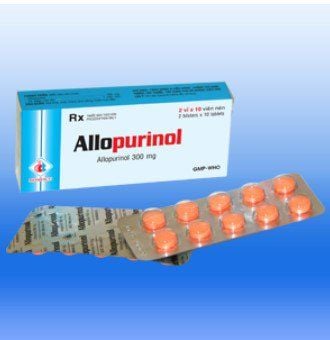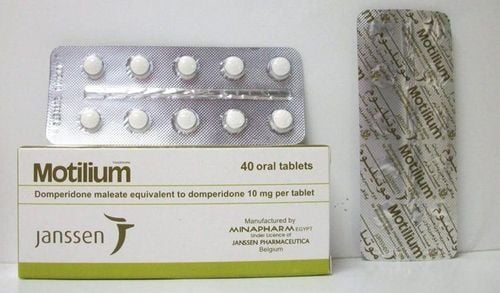This is an automatically translated article.
Over-the-counter (OTC) drugs are medicines you can buy without a prescription from your doctor. Nonsteroidal anti-inflammatory drugs (NSAIDs) are medications that help reduce inflammation and often provide pain relief. These non-steroidal anti-inflammatory drugs are also over-the-counter medications.
1. Over-the-counter anti-inflammatory drugs
Over-the-counter (OTC) drugs are medicines you can buy without a prescription from your doctor. Nonsteroidal anti-inflammatory drugs (NSAIDs) are medicines that reduce inflammation and often help with pain. , Naprosyn) Nonsteroidal anti-inflammatory drugs can be very effective. They tend to work quickly and often have fewer side effects than corticosteroids, which also work to reduce inflammation.
2. Use over-the-counter anti-inflammatory drugs
Nonsteroidal anti-inflammatory drugs work by blocking prostaglandins, which increase the sensitivity of your nerve endings and increase pain during inflammation. In addition, prostaglandins also play a role in controlling your body temperature.
By inhibiting the action of prostaglandins, over-the-counter anti-inflammatory drugs can help fight inflammation, relieve pain, and reduce fever. In fact, nonsteroidal anti-inflammatory drugs can be helpful in reducing many types of discomfort, including:
Headaches Back pain Muscle pain and stiffness due to arthritis and other inflammatory conditions Menstrual cramps Pain After a minor surgery Sprain or other injury Non-steroidal anti-inflammatory drugs are especially important for controlling the symptoms of arthritis, such as joint pain, inflammation, and stiffness. These drugs are often cheap and easily accessible, so they are often the first drugs prescribed for people with arthritis.
The prescription drug celecoxib (Celebrex) is commonly prescribed for the long-term treatment of arthritis symptoms. This is because it gets into your stomach more easily than other nonsteroidal anti-inflammatory drugs.

Người bệnh đau đầu có thể dùng thuốc giảm đau không kê đơn
3. Over-the-counter anti-inflammatory drugs
Nonsteroidal anti-inflammatory drugs block the enzyme cyclooxygenase (COX) that makes prostaglandins. Your body makes two types of COX: COX-1 and COX-2.
COX-1 has a protective effect on your stomach lining, while COX-2 causes inflammation. Most nonsteroidal anti-inflammatory drugs are nonspecific, which means they block both COX-1 and COX-2.
Over-the-counter NSAIDs include:
High-dose aspirin Ibuprofen (Advil, Motrin, Midol) Naproxen (Aleve, Naprosyn) Low-dose aspirin is not generally classified as a nonsteroidal anti-inflammatory drug.
Non-specific NSAIDs available by prescription include:
Diclofenac (Zorvolex) Diflunisal Etodolac Famotidine / ibuprofen (Duexis) Flurbiprofen Indomethacin (Tivorbex) Ketoprofen Mefenamic acid (Ponstel) Meloxicam (Vivlodex, Mobic) Nabumetone Oxaprozin (Daypro Oxaprozin) ) Piroxicam (Feldene) Sulindac Selective COX-2 inhibitors are nonsteroidal anti-inflammatory drugs that block COX-2 more than COX-1. Celecoxib (Celebrex) is currently the only selective COX-2 inhibitor available by prescription.
4. Side effects of anti-inflammatory drugs
Just because you can buy some anti-inflammatory drugs without a prescription does not mean they are completely harmless. There can be side effects and risks to using over-the-counter anti-inflammatory drugs, the most common of which are abdominal pain, bloating, and diarrhea.
Over-the-counter anti-inflammatory drugs are usually designed for occasional and short-term use. So the risk of side effects increases the longer you use them.
Always talk to your healthcare provider before using non-steroidal anti-inflammatory drugs and do not take different anti-inflammatory drugs at the same time.

Khi sử dụng thuốc, người bệnh cần lưu ý đến tác dụng phụ
Abdominal pain Bloating Diarrhea Heartburn Nausea and vomiting Constipation In more severe cases, Taking nonsteroidal anti-inflammatory drugs can irritate your stomach lining enough to cause a stomach ulcer. Some ulcers can even lead to bleeding in the stomach.
If you experience any of the following symptoms, stop taking your nonsteroidal anti-inflammatory drug immediately and call your doctor:
Severe abdominal pain Black stools Blood in your stools Risk of side effects stomach side effects are higher for people who:
Use NSAIDs regularly Have a history of stomach ulcers Take anticoagulants or corticosteroids People over 65 You can reduce the chance of stomach side effects by how to take anti-inflammatory drugs with food, milk, or antacids.
If you experience gastrointestinal side effects, your doctor may encourage you to switch to a selective COX-2 inhibitor such as celecoxib (Celebrex). They are less likely to cause gastric irritation than non-specific anti-inflammatory drugs.
4.2. Heart Complications of Non-Steroidal Anti-Inflammatory Drugs Taking non-steroidal anti-inflammatory drugs increases the risk of cardiovascular diseases, including:
Heart attack Heart failure Stroke Blood clots The risk of developing these conditions increases increased with frequent and higher doses of anti-inflammatory drugs.
People with cardiovascular disease are at increased risk for heart-related side effects when taking nonsteroidal anti-inflammatory drugs.
4.3. When to get medical attention Stop taking nonsteroidal anti-inflammatory drugs immediately and seek medical attention if you experience any of the following symptoms:
Tinnitus Blurred vision Rash, hives and itching Edema There is blood in your urine or stools Vomiting and blood in your vomit Severe stomach pain Chest pain Tachycardia Jaundice

Khi xuất hiện tình trạng tim đập nhanh, người bệnh cần đến cơ sở y tế ngay
5. Over-the-counter anti-inflammatory drug interactions
Non-steroidal anti-inflammatory drugs can interact with other drugs. Some drugs become less effective when they interact with nonsteroidal anti-inflammatory drugs. Two good examples are blood pressure medications and low-dose aspirin (when used for anticoagulation).
Other drug combinations can also cause serious side effects. Use caution if you take the following medicines:
Warfarin : a nonsteroidal anti-inflammatory drug that can actually enhance the effects of warfarin (Coumadin), a medicine used to prevent or treat blood clots. The combination can lead to excessive bleeding. Cyclosporine: Cyclosporine (Neoral, Sandimmune) is used to treat arthritis or ulcerative colitis (UC). This medicine is also prescribed to people who have had an organ transplant. Taking Cyclosporine along with nonsteroidal anti-inflammatory drugs can lead to kidney damage. Lithium: combining a nonsteroidal anti-inflammatory drug with a mood stabilizer lithium can lead to a dangerous buildup of lithium in your body. Low-dose aspirin: Taking over-the-counter anti-inflammatory drugs with low-dose aspirin may increase your risk of developing stomach ulcers. Selective serotonin reuptake inhibitors (SSRIs): bleeding in the digestive system can also occur if you take nonsteroidal anti-inflammatory drugs with selective serotonin reuptake inhibitors. Diuretics: There are usually no problems when taking non-steroidal anti-inflammatory drugs along with diuretics. However, your doctor should monitor for high blood pressure and kidney damage while you take both drugs.
6. Note when using over-the-counter anti-inflammatory drugs for children
Always check with your doctor before giving any nonsteroidal anti-inflammatory drug to a child under 2 years of age. Dosage for children is based on weight, so read the dosage chart that comes with the medicine to determine the dosage for your child.
Ibuprofen (Advil, Motrin, Midol) is the most commonly used over-the-counter anti-inflammatory drug in children. It is also the only one approved for use in infants under 3 months of age. Meanwhile, Naproxen (Aleve, Naprosyn) can be given to children over 12 years of age.
Although aspirin is approved for use in children over 3 years of age, children 17 years of age and younger who have chickenpox or the flu should avoid aspirin and aspirin-containing products.
Giving aspirin to a child can increase the risk of Reye's syndrome, a serious condition that causes swelling in the liver and brain.
Reye's syndrome:
The initial symptoms of Reye's syndrome usually occur during recovery from a viral infection, such as chickenpox or the flu. However, a person can also develop Reye's syndrome 3 to 5 days after the onset of the infection.
Initial symptoms in children under 2 years of age include diarrhea and rapid breathing. Early symptoms in older children and adolescents include vomiting and unusual sleepiness.
More serious symptoms of Reye's syndrome include:
Confusion or hallucinations Aggressive or irrational behavior Weakness or paralysis in the arms and legs Convulsions Loss of consciousness Early diagnosis and treatment can be life-saving wings for people with Reye's syndrome. So if you suspect that your child has Reye's syndrome, seek immediate medical attention.
7. Tips for using over-the-counter anti-inflammatory drugs
To get the best results from your treatment with over-the-counter anti-inflammatory drugs, follow these tips.
Assess your needs: some over-the-counter medications, such as acetaminophen (Tylenol) are great for pain but not inflammation. Nonsteroidal anti-inflammatory drugs are probably a better choice for arthritis and other inflammatory conditions. Read the directions carefully: some over-the-counter products combine acetaminophen and an anti-inflammatory drug. Nonsteroidal anti-inflammatory drugs can be found in some cold and flu medicines. Be sure to read the ingredient lists of all over-the-counter medicines so you know how much you're taking. Taking too many products with the same active ingredient increases the risk of side effects.
Store medicines properly: over-the-counter anti-inflammatory drugs can lose their effectiveness before their expiration date if you store them in a hot, humid place, such as a medicine cabinet in the bathroom. To keep for a long time, keep the medicine in a cool, dry place. Take the right dose: When taking over-the-counter anti-inflammatory drugs, be sure to read and follow the directions. Products vary in strength, so make sure you take the correct dose each time.

Người bệnh nên uống thuốc chống viêm không kê đơn đúng liều và đúng cách
8. When to avoid using over-the-counter anti-inflammatory drugs
Nonsteroidal anti-inflammatory drugs are not a good idea for everyone. Before taking these medicines, check with your doctor if you have or have had one of the following conditions:
Allergic reaction to aspirin or another pain reliever. Blood disease Stomach bleeding, peptic ulcer or intestinal problems High blood pressure or heart disease Liver or kidney disease Difficult-to-control diabetes History of stroke or heart attack Consult a doctor your doctor if you are over 65 years old and plan to take a nonsteroidal anti-inflammatory drug.
If you are pregnant, consult your doctor before taking non-steroidal anti-inflammatory drugs. A few studies have found that taking nonsteroidal anti-inflammatory drugs early in your pregnancy may increase your risk of miscarriage, but more research is needed on this.
Doctors recommend against taking non-steroidal anti-inflammatory drugs during the third trimester of pregnancy. They can cause blood vessels in the baby's heart to close prematurely.
You should also talk to your doctor about the safety of using nonsteroidal anti-inflammatory drugs if you consume alcoholic beverages every day or if you take anticoagulants.
Nonsteroidal anti-inflammatory drugs can be great for reducing pain caused by inflammation, and many of these are available over the counter without a prescription. However, you should still consult your doctor before using these over-the-counter anti-inflammatory drugs.
Please dial HOTLINE for more information or register for an appointment HERE. Download MyVinmec app to make appointments faster and to manage your bookings easily.
Reference source: healthline.com












